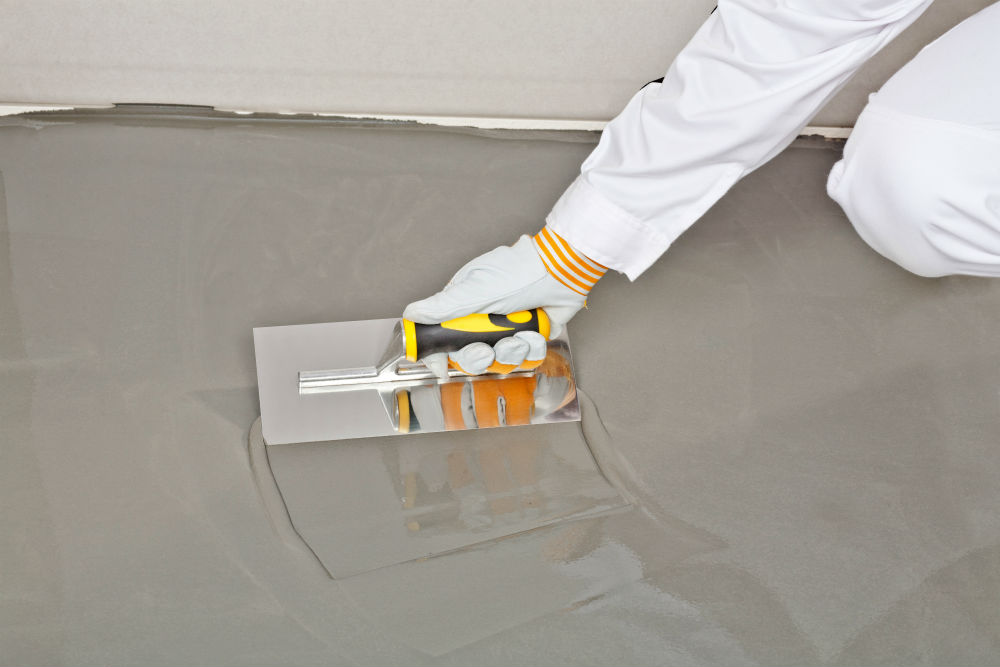Self-leveling concrete is a popular, poured concrete-like substance that is often used as a floor underlayment in preparation for tiling, vinyl flooring, or just on its own. Self-leveling concrete has grown in popularity in the past few decades as the requirements for smoothness and flatness of modern floors have required a more uniform, consistent surface to work with.
In this post, we’re explaining some of the nuanced facts about self-leveling concrete, and we’ll be telling you exactly what you need to know before working with it.
The Difference Between Self-Leveling Concrete and Regular Concrete
Traditional concrete requires a large amount of water to achieve the fluidity needed to pour it effectively. Self-leveling concrete removes the need for as much water while maintaining the fluidity of the concrete. In fact, self-leveling concrete can be more fluid than traditional concrete, in some cases. It’s consistency has been described as similar to that of pancake batter, whereas traditional concrete is much thicker and coarser.
What makes self-leveling concrete different from regular concrete is the high amount of polymers that are used to manufacture it. Polymers are unique, glue-like molecules that work to bond a substance together. Polymers are used in everything from leather to wood and from computers to paints and metal coverings.
Self-leveling concrete is more expensive gallon-for-gallon because of the added cost required to create it. However, this versatile substance can often be used instead of demolishing damaged concrete and replacing it. Most home remodeling businesses don’t even know that instead of tearing up old concrete that appears too far gone, they can use a ½-inch-thick layer of self-leveling concrete to restore the floor and immediately improve its aesthetic.
Why Use Self-Leveling Concrete?
With as much as self-leveling concrete is being used, the next obvious question that arises is why you’d want to use self-leveling concrete in the first place. The biggest reasons are:
- To re-surface an entire concrete floor. When pitting, cracking, and splitting develops into a problem that cannot be fixed through the use of traditional concrete patching compounds, self-leveling concrete can be a great alternative.
- To spot-fix flat or uneven spots. Mudjacking and polyurethane injections are sometimes the only solutions for uneven slabs. However, many flat or uneven slabs can be corrected by grinding the slab and using self-leveling concrete to restore the smoothness.
- As a standalone, finished flooring material. The raw, industrial look of natural concrete can be made to look great with many different design themes. Coloring additives in self-leveling concrete can create interesting finishes that complement existing or planned decor, paint, or accessory features like backsplashes and accent tiling.
Regardless of why or how it’s being used, self-leveling concrete can be an especially cost-effective flooring solution. This is doubly true in projects that might have otherwise required the complete demolition of a floor, subfloor, and even foundation. If a floor can be saved and a simple, ½ inch-thick layer of self-leveling concrete can be used to revitalize it, then it’s a win-win.
As efficient and versatile as this amazing substance can be, it’s important to note that there are instances in which using self-leveling concrete would not be advisable.
When Self-Leveling Concrete Should Not Be Used
Also, any vertical surface won’t be a candidate for self-leveling concrete. The reason for this is because polymer-mixed, self-leveling concrete is much more of a slurry-like substance, and it doesn’t cure that well on any surface that isn’t horizontal and flat.
Lastly, self-leveling concrete shouldn’t be used in areas where harsh chemicals will be present or where heavy machinery will be installed or operating. This is because—even as good-looking and smooth as it is—self-leveling concrete isn’t as resilient or structurally sound as traditional concrete.
Have More Questions? Send ‘Em Our Way
As with any significant home or business improvement project that calls for the use of concrete, it’s going to help to have an expert evaluate your unique project to see if using self-leveling concrete is the best course of action.
At AAA Concrete Raising, we know concrete and concrete-based products best because it’s all we do. When you’re ready to work with proven professionals to achieve success with your concrete job, we’ll be happy to help.
For more information, contact us today.
